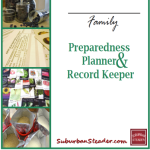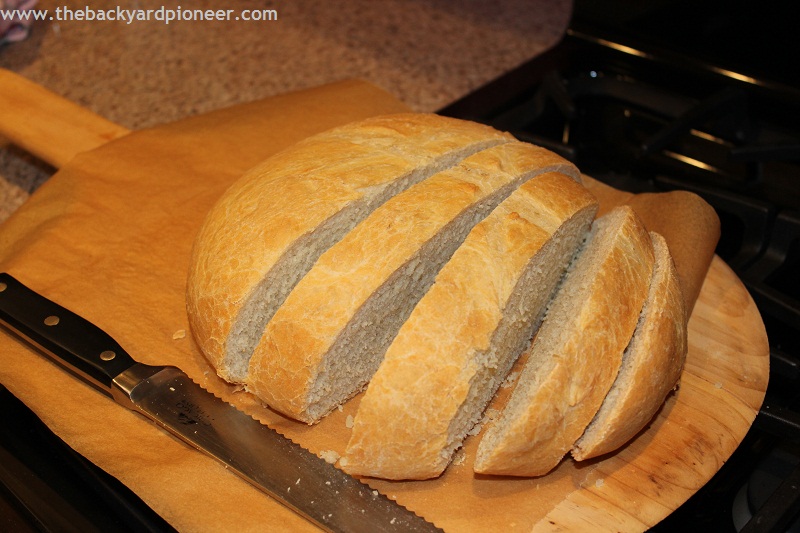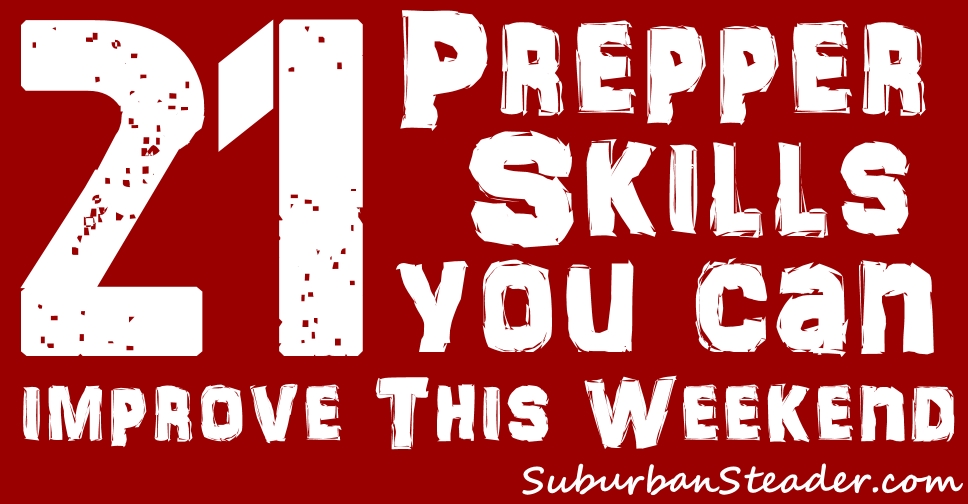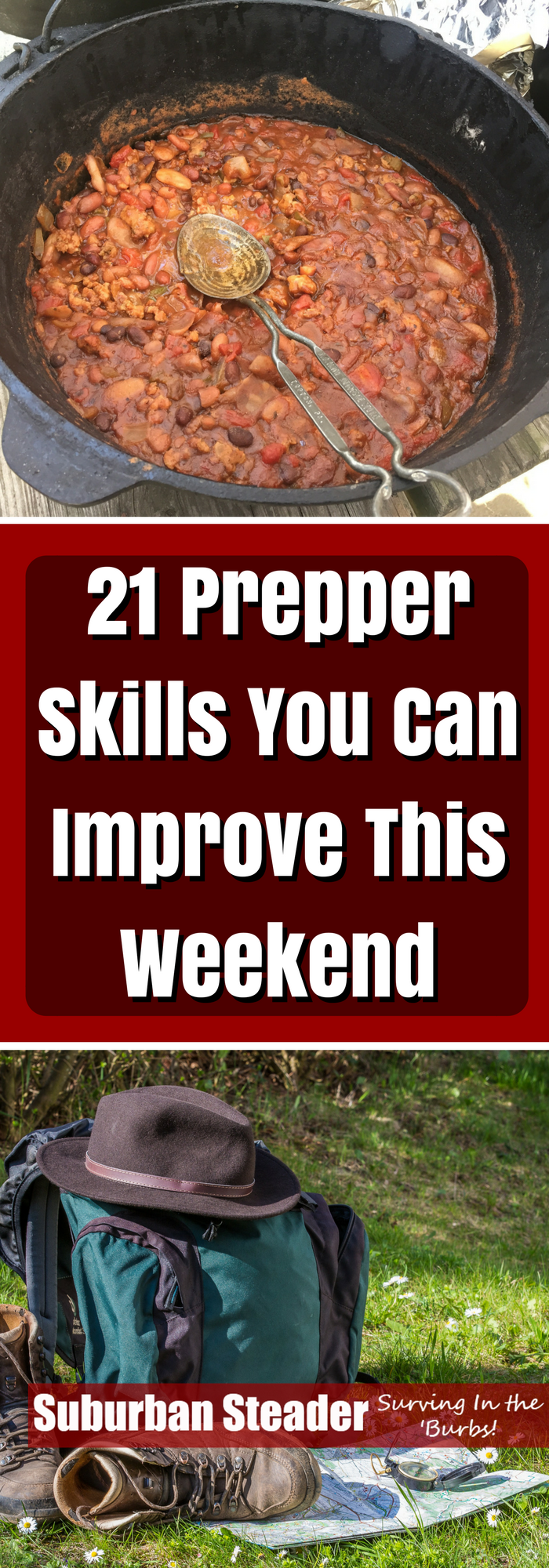I’m not sure what it’s going to be like by you this weekend but here, on Long Island, it’s the middle of winter. We’re expecting a cold, raw weekend with some snow possibly coming our way. It’s not really going to be outdoors weather, although learning how to survive in this kind of weather wouldn’t be a bad idea. But, with this kind of weekend in mind, I got to thinking about how I could improve as a prepper. I came up with this list of prepper skills that you (and I) could explore and improve over a weekend. Make me one promise – don’t just read, do!
1. Cook Something
Cooking is one of the most important survival skills and, in my opinion, is one of the most important prepper skills you can master. You all know that food is part of the Rule of 3’s – 3 minutes without air, 3 days without water, 3 weeks without food – but what you probably also realize is that food can be more than just energy for people. It can be a comforting item, making those stressful situations a little better. So learn how to cook. I’ve got a few recipes on here that you can try including:
2. Go Shooting
Want to blow off some steam this weekend and have a good time doing it? Then hit the range! You’re sure to have a good time no matter if you’re shooting a handgun, zeroing in your rifle or popping clays with your shotgun. Being that ammo is expensive, you could also improve your prepper skills by doing some tactical training at home. It’s free and could be quite beneficial to you if bad times come knocking.
3. Improve Your DIY Skills
Preppers and suburban homesteaders meet at the crux of DIY. Both sides have an innate ability to fix whatever is broken or create something out of random odds and ends. Undertaking a project like the bullet casing earbuds I wrote about recently will improve your abilities and spark your creative nature. You’ll start looking at common material around the house and figuring how your new-found prepper skills can use it to make something useful.
4. Start A Fire
No matter who you ask, the ability to start a fire is one of the top prepper skills – or survival skills in general – that everyone should have. Spends some time learning how to start fires with all of these fire starters this weekend:
5. Get Your Preps Organized
 Being organized now will help you avoid running around like a maniac with all hell breaks loose. I know, you’re thinking “Really? Being organized is one of the prepper skills you’re suggesting?” Yup, I am absolutely advocating getting organized now. There’s multiple reason to do so including having a much better understanding of where your weakness are and how you can improve your preps. I recommend using this planner to get your preps in order.
Being organized now will help you avoid running around like a maniac with all hell breaks loose. I know, you’re thinking “Really? Being organized is one of the prepper skills you’re suggesting?” Yup, I am absolutely advocating getting organized now. There’s multiple reason to do so including having a much better understanding of where your weakness are and how you can improve your preps. I recommend using this planner to get your preps in order.
6. Learn The Art Of Canning
As any prepper knows, food preservation is one of the most important prepper skills you can have. Learning how to can different kinds of food will help you build your preps up and also save you money. I’ve actually seen canning save money in multiple ways – people are putting food away to be eaten at a later time which saves money and they usually buy food in bulk when they are canning which reduces the overall food bill when you look at it on a per meal basis. Plus, canning is just a great old-school skill to have in your repertoire.
7. Dutch Oven Cooking
So, you want your prepper skills to be a little more rustic, do you? Why not try dutch oven cooking this weekend? Cooking in a dutch oven is a great skill to have if the power goes out or if you’re camping. Plus, there is just something so much tastier (to me, anyways) about food cooked in or on cast iron than food cook with regular kitchen equipment. Get outside, stoke the coals and learn how to make food like your pioneering ancestors used to!
8. Start A Compost Pile
Picture your garden like a bank. The crops are your return on investment and the soil is your principle. How do you increase your principle? You increase the value of the soil. And you do that by adding quality compost to the garden. Building a compost pile is one of the prepper skills that I believe every prepper – from suburban homesteader to ultra hardcore survivalist – should have in their back pocket. It’s super easy to do and can return huge profit to you.
9. Get Your Finances In Order
You shouldn’t be prepping if you are in debt. In fact, what use is there in prepping if you are building up your debt. Spend the weekend getting your finances in order to achieve financial independence. You’ll take stress off yourself, your marriage and your career. Not to mention, you’ll be able to buy some cooler preps now that you have more disposable money because you’re not paying those monthly bills!
10. Build A Black Out Box
This one is so simple that you should be ashamed if you haven’t done it already. The most common event you are going to need to prep for is a power outage. They occur more often than hurricanes, snowstorms, tornadoes or zombie apocalypses. And building a black out box is so easy. Spend a few hours with the kids this weekend and knock it out. You’ll thank me later.
11. Outfit Your Automobile EDC
You spend a lot of your life in your car, whether its driving to and from work and taxiing the kids around to whatever activity they have next. Are you prepared for an emergency if you got caught in your car? Not sure? Then maybe you should take a few minutes looking into your automobile’s EDC this weekend and making sure you can handle what kind of travel-trouble may come your way.
12. Get Your HAM License
Communication is one of those prepper skills that everyone talks about but very few people practice. I’ll be the first to admit that communication is one of, if not the, weakest area of prepping for our family. A good way to improve this skill is to get your HAM license. Again, I can’t speak from personal experience, but everyone says it’s a fairly easy test. They all recommend using a study guide prior to taking the test.
13. Read A Book
Want to brush up on some prepper skills, get lost in a good story or learn about the biology of your garden? Then read a book. Reading books is a great way to escape the world for a while and they also provide a wealth of knowledge. You can go with a great fictional story like Glen Tate’s 299 Days series or jump into something more non-fiction like Jim Cobb’s “Prepper’s Long-Term Survival Guide.” Either way, you won’t waste your time and might even learn something.
14. Go Hiking
Hiking as a prepper skill? Believe it or not, yes. Going out hiking puts you in the outdoors. You get used to walking around with a pack on (ever actually spent time lugging your BOB around?), you learn what it’s like to be in the woods and you get some exercise. All of those items are beneficial to the prepper. Just make sure you’ve got sturdy footwear when you head out.
15. Build A Worm Bin
Remember how I said compost how you increase the principle in your garden? Well worm castings and worm tea help as well. It is super easy to build a worm bin and the return on investment is terrific! For maybe an hours worth of work, you’ll be able to get pounds and pounds of great organic matter for your garden not to mention the awesome ‘worm tea’ that you can use to fertilize your fruits and vegetables.
 16. Bake Fresh Bread
16. Bake Fresh Bread
My buddy Mike over at The Backyard Pioneer got me into baking bread at home. I cannot begin to describe how comforting it is to smell bread baking in the oven. And the taste! Oh, the taste! You won’t get this kind of taste out of store-bought bread. Baking bread probably isn’t tops on the list of required prepper skills but there is something so very
17. Perform A Site Survey
Still not sure what to do with your suburban homestead? How about performing a site survey this weekend? You can knock it out in a few hours and it will give you a great idea of your land, what you can and cannot do on it and where to plant different items. It also provides a map of your property for any future developments you want to do.
18. Outfit Your Personal EDC
Prepping is all about being prepared and the way you guarantee you’re prepared when you’re just walking around is to be fully outfitted in your Every Day Carry (EDC). You should take some time this weekend to think about your EDC methodology consider what you’ll put in your Tier 1 and Tier 2 kits. Regardless of where they fit into your EDC kits, I recommend the following individual items having a home in your EDC:
19. Learn About Your Garden Zones
Learning about where you live is just as important as a skill for gardeners and homesteaders as understanding how your crops grow. Prepper skills aren’t always hard skills; sometimes it’s about educating yourself. Learning which USDA zone you live in will help you better understand which crops will grow best and when your first and last frost are.
20. Sharpen Your Knives And Tools
A sharp knife is a safe knife. I can personally tell you that I have had more accidents with a dull tool than a sharp tool – to the point where I almost cut my fingertip off once. Spending a weekend sharpening your knives and tools would be a great way to improve your prepper skills. Not sure how to sharpen something? Check out this instructional video from Patrick at MTKnives.net.
21. Plan Your Spring Garden
There is absolutely no better way to shake the bone chill of winter on a cold, snowy night than to flip through seed catalogs while you plan your spring garden. Planning a garden is both exciting and therapeutic. You can explore all different kinds of produce that you might want to grow and also relax knowing that you won’t have a push in the spring to get your seeds on order and your planting all planned out.
So there you have it – 21 great ways you can improve your prepper skills this weekend. Most of these tasks are free or fairly low in cost. All of them will make you a better suburban homesteader and a better prepper.
What are you going to try? Let us know in the comments below.




 16. Bake Fresh Bread
16. Bake Fresh Bread
